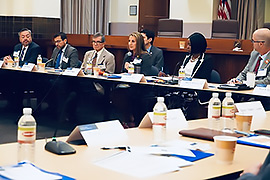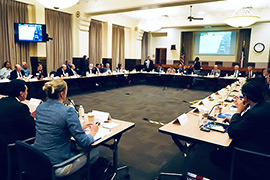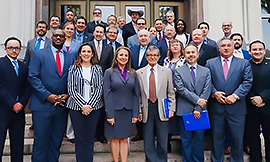Secretary Hughs Convenes Second Border Trade Advisory Committee Meeting Of 2019
By establishing a clear and well-defined Border Transportation Master Plan, we will communicate to our state, federal, and international counterparts the resources needed to ensure that border communities thrive

(Secretary Hughs convenes the second Border Trade
Advisory Committee meeting of 2019. Office
of the
Texas Secretary of State, 10/17/2019)

(BTAC members discuss the Texas-Mexico Border
Transportation Master Plan. Office
of the Texas S
ecretary of State, 10/17/2019)

(The Secretary and BTAC members pose for a group
photo outside TxDOT following their meeting. Office
of the Texas Secretary of State, 10/17/2019)
AUSTIN - Texas Secretary of State Ruth Hughs today convened the second Border Trade Advisory Committee (BTAC) meeting of 2019, bringing together stakeholders from throughout the Texas-Mexico border region to advance initiatives to address challenges related to international trade with Mexico. In her capacity as Texas' Border Commerce Coordinator, Secretary Hughs works closely in conjunction with the Texas Department of Transportation (TxDOT) and Committee members to discuss strategies to better facilitate cross-border trade, improve transportation infrastructure and cargo processing, and increase coordination with public officials in Mexico.
The Secretary began by introducing her vision for the Committee and emphasizing the need for border stakeholders to work collaboratively to address challenges affecting entities, businesses, and individuals who rely on the robust trade relationship between Texas and Mexico.
"I am grateful for the opportunity to join you all today as we discuss the unique challenges and opportunities that your communities face in expanding cross-border economic activity," said Secretary Hughs. "By establishing a clear and well-defined Border Transportation Master Plan, we will communicate to our state, federal, and international counterparts the resources needed to ensure that border communities thrive – because your success is our success, and when we all succeed, Texas succeeds."
Following a review of prior BTAC activities and accomplishments, the Committee engaged in a group discussion on the Texas-Mexico Border Transportation Master Plan, including feedback provided to TxDOT on its recent listening tours throughout the border region. The Master Plan, expected to be completed in 2020, is designed to identify transportation infrastructure challenges, solicit feedback from stakeholders throughout the border region, and implement long-term strategies for continuing to facilitate cross-border trade. The committee reviewed extensive input gathered at TxDOT's public meetings and identified areas in which local, state, and U.S. and Mexican federal officials can coordinate to improve efficiency in the movement of freight, goods, and people at Texas' 28 ports of entry.
###
